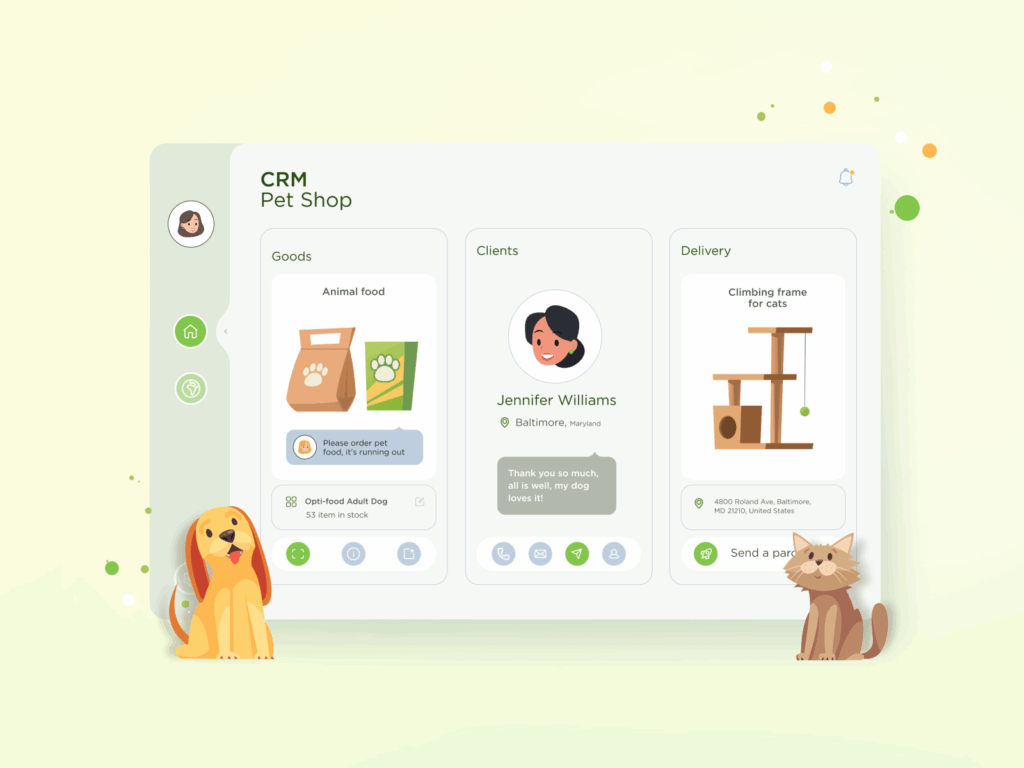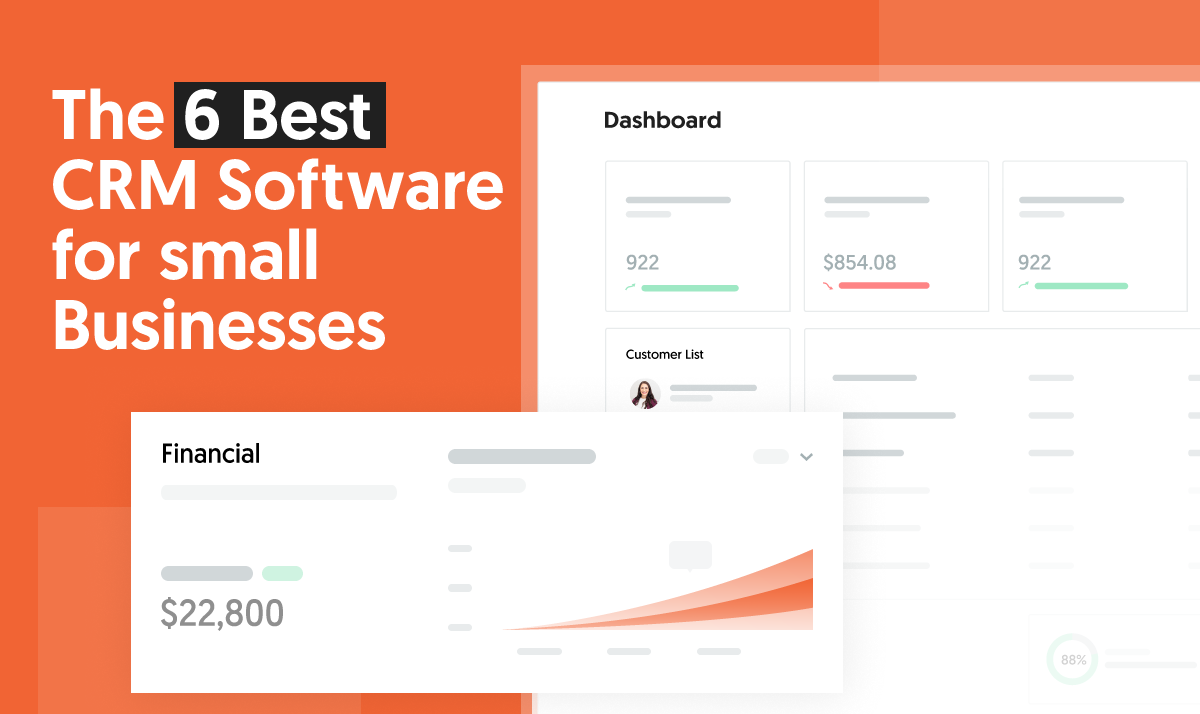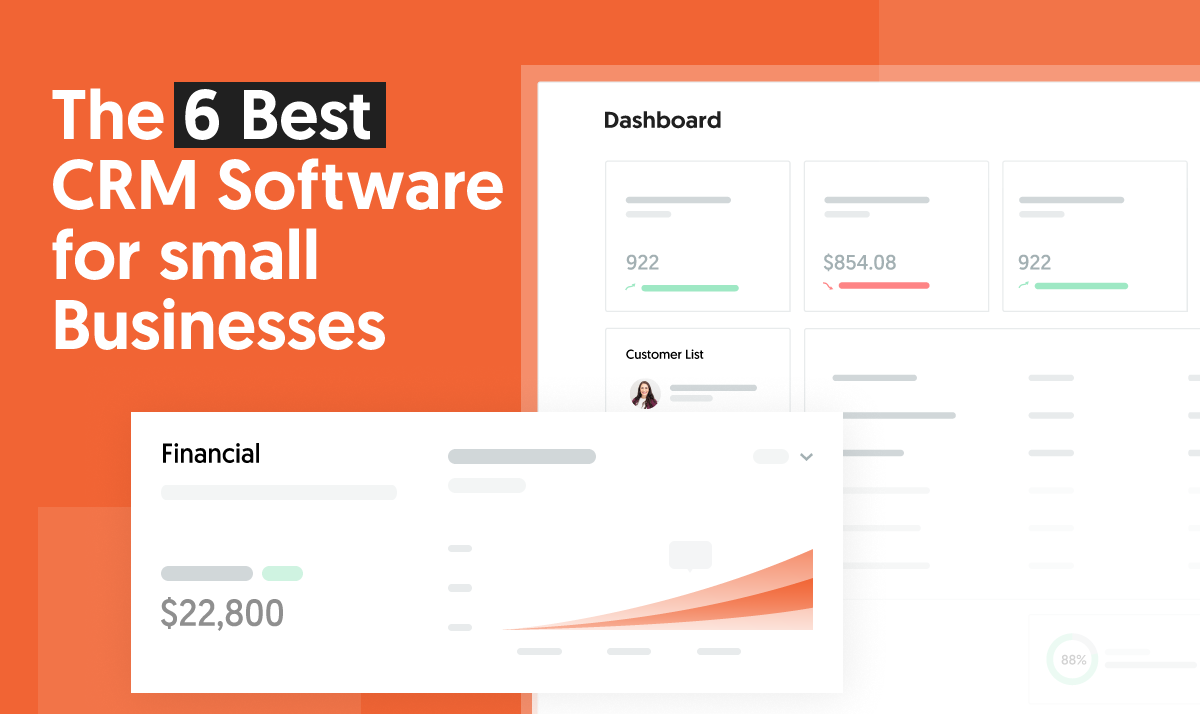Purrfect Partnership: Choosing the Best CRM for Your Small Pet Store

Purrfect Partnership: Choosing the Best CRM for Your Small Pet Store
Running a small pet store is a labor of love. You’re not just selling products; you’re building relationships with pet owners and their furry, scaly, or feathered companions. In today’s digital world, managing those relationships efficiently is crucial for success. That’s where a Customer Relationship Management (CRM) system comes in. This guide will help you navigate the world of CRMs and choose the best one for your small pet store, ensuring you can focus on what you love: pets and their people.
Why Your Small Pet Store Needs a CRM
Imagine this: a regular customer, Mrs. Gable, comes in for her cat, Mittens’ favorite salmon pate. You remember Mittens, you remember Mrs. Gable, but you can’t quite recall if Mittens has any allergies. A CRM system solves this. It’s more than just a contact list; it’s a central hub for all customer interactions, preferences, and purchase history. Here’s why a CRM is essential for your small pet store:
- Improved Customer Service: Accessing customer information instantly allows you to personalize interactions. You can greet customers by name, remember their pets’ names, and offer tailored recommendations.
- Enhanced Marketing: CRM systems allow you to segment your customers based on their purchase history, pet types, or other criteria. This enables targeted marketing campaigns, such as sending a discount on dog food to customers who own dogs.
- Increased Sales: By understanding your customers’ needs and preferences, you can proactively offer relevant products and services, leading to increased sales and customer loyalty.
- Streamlined Operations: A CRM can automate tasks like appointment scheduling, follow-up emails, and loyalty program management, freeing up your time to focus on other aspects of your business.
- Data-Driven Decisions: CRMs provide valuable insights into your customer base, sales trends, and marketing effectiveness. This data helps you make informed decisions about your business.
Key Features to Look for in a CRM for Pet Stores
Not all CRMs are created equal. For your small pet store, you need a system that’s tailored to your specific needs. Here are the key features to prioritize:
1. Contact Management
This is the foundation of any CRM. Look for a system that allows you to:
- Store detailed customer information, including names, contact details, pet information (species, breed, age, health issues, allergies), and purchase history.
- Easily search and filter your contact database.
- Add notes and tags to customer profiles to capture important details.
2. Appointment Scheduling
If you offer grooming, training, or veterinary services, integrated appointment scheduling is a must-have. Look for a system that:
- Allows customers to book appointments online or through your CRM.
- Sends automated appointment reminders to reduce no-shows.
- Manages staff schedules and availability.
3. Sales and Order Tracking
Keep track of sales, orders, and inventory with these functionalities:
- Record sales transactions and generate invoices.
- Track order status and shipping information.
- Integrate with your point-of-sale (POS) system for seamless data transfer.
4. Marketing Automation
Automate your marketing efforts with these tools:
- Create and send targeted email campaigns.
- Segment your customer base for personalized messaging.
- Track email open rates, click-through rates, and conversions.
5. Loyalty Program Management
Reward your loyal customers with a loyalty program, facilitated by your CRM:
- Set up a points-based system or a tiered rewards program.
- Track points earned and redeemed.
- Automate reward notifications and redemptions.
6. Reporting and Analytics
Gain insights into your business performance with these reporting features:
- Track key metrics such as sales, customer acquisition cost, and customer lifetime value.
- Generate reports on sales trends, customer behavior, and marketing campaign effectiveness.
- Visualize data with charts and graphs.
7. Integration Capabilities
Make sure the CRM integrates with the tools you already use:
- POS system
- Email marketing platform
- Social media platforms
- Accounting software
Top CRM Systems for Small Pet Stores
Now that you know what to look for, let’s explore some of the best CRM systems for your small pet store:
1. HubSpot CRM
HubSpot CRM is a popular choice for small businesses, and for good reason. It’s free to start, user-friendly, and offers a comprehensive suite of features, including contact management, sales pipeline management, and marketing automation. While the free version has limitations, it’s an excellent starting point for small pet stores, and its scalability makes it a good option for future growth.
- Pros: Free plan available, user-friendly interface, strong marketing automation capabilities, excellent integration with other HubSpot tools.
- Cons: Limited features in the free plan, can become expensive as your business grows, may not have pet-specific features.
- Best for: Small pet stores looking for a free and easy-to-use CRM with strong marketing capabilities.
2. Zoho CRM
Zoho CRM is a robust and affordable option that offers a wide range of features, including contact management, sales force automation, and customer support tools. It’s highly customizable and offers excellent integration with other Zoho apps. Zoho CRM offers a free plan for up to three users, making it a viable option for very small pet stores. Paid plans offer more features and scalability.
- Pros: Affordable pricing, highly customizable, good integration with other Zoho apps, comprehensive features.
- Cons: Can be overwhelming for beginners, interface might take some getting used to.
- Best for: Small pet stores needing a powerful and affordable CRM with a wide range of features and customization options.
3. Pipedrive
Pipedrive is a sales-focused CRM that’s known for its intuitive interface and visual sales pipeline. It’s a great choice if you want to streamline your sales process and track your leads effectively. While it might not have all the features of some other CRMs, its simplicity and ease of use make it a good option for small pet stores that prioritize sales.
- Pros: User-friendly interface, visual sales pipeline, excellent for sales tracking.
- Cons: Limited features compared to other CRMs, may not be ideal for complex marketing automation.
- Best for: Small pet stores that want to focus on sales and need a simple and effective sales pipeline management tool.
4. Agile CRM
Agile CRM is an all-in-one CRM that offers a comprehensive suite of features, including contact management, sales automation, marketing automation, and help desk. It’s a good option for small pet stores that want a CRM with a wide range of functionalities. Agile CRM offers a free plan for up to 10 users, making it suitable for small businesses.
- Pros: All-in-one solution, affordable pricing, good marketing automation capabilities.
- Cons: Interface can be a bit cluttered, learning curve may be steeper than other CRMs.
- Best for: Small pet stores looking for an all-in-one CRM with sales, marketing, and customer support features.
5. Keap (formerly Infusionsoft)
Keap is a powerful CRM designed for small businesses that need advanced marketing automation and sales tools. It’s a more complex system than some of the other options, but it offers a wealth of features, including email marketing, landing pages, and sales pipelines. Keap’s focus is on helping businesses automate their sales and marketing processes to drive growth. It’s not the cheapest option, but the features are well worth the investment for some pet stores.
- Pros: Powerful marketing automation, advanced sales tools, excellent for lead generation and nurturing.
- Cons: More expensive than other CRMs, steeper learning curve.
- Best for: Small pet stores that need advanced marketing automation and sales tools to generate leads and drive conversions.
How to Choose the Right CRM for Your Pet Store
Choosing the right CRM for your small pet store is a crucial decision. Here’s a step-by-step guide to help you make the right choice:
- Define Your Needs: Before you start evaluating CRM systems, identify your specific needs and goals. What problems are you trying to solve? What features are essential for your business? Consider what your pet store offers, such as grooming, training, or specific product lines.
- Set a Budget: Determine how much you’re willing to spend on a CRM system. Consider both the initial setup costs and the ongoing subscription fees. Free options can be a good starting point, but they may lack the features you need for long-term growth.
- Research CRM Options: Explore the different CRM systems available, considering their features, pricing, and reviews. Read customer testimonials and case studies to get a better understanding of each system’s strengths and weaknesses.
- Evaluate Features: Make a list of the features you need and compare the CRM systems based on those requirements. Prioritize the features that are most important for your business.
- Consider Ease of Use: Choose a CRM that’s easy to use and navigate. A user-friendly interface will save you time and effort in the long run.
- Check Integration Capabilities: Ensure that the CRM integrates with the other tools you use, such as your POS system, email marketing platform, and accounting software.
- Request Demos and Trials: Many CRM systems offer free demos or trial periods. Take advantage of these opportunities to test out the systems and see if they’re a good fit for your business.
- Read Reviews: Read online reviews from other small business owners in the pet industry. This will give you valuable insights into the real-world experiences of other users.
- Consider Scalability: Choose a CRM that can grow with your business. As your pet store expands, you’ll need a system that can handle more customers, data, and features.
- Get Training and Support: Make sure the CRM provider offers adequate training and support to help you get started and troubleshoot any issues.
Tips for Implementing Your New CRM
Once you’ve chosen your CRM, it’s time to implement it. Here are some tips to ensure a smooth transition:
- Plan Your Implementation: Develop a detailed plan for implementing your CRM, including timelines, tasks, and responsibilities.
- Clean Up Your Data: Before importing your data into the CRM, clean it up to remove duplicates, correct errors, and standardize formatting.
- Import Your Data: Import your customer data, product information, and other relevant data into the CRM.
- Customize the System: Configure the CRM to meet your specific needs, such as setting up custom fields, workflows, and reports.
- Train Your Staff: Provide comprehensive training to your staff on how to use the CRM. Make sure they understand its features and how it can help them improve their customer service and sales performance.
- Test the System: Before going live, test the CRM thoroughly to ensure that it’s working properly.
- Monitor and Optimize: After implementation, monitor the CRM’s performance and make adjustments as needed. Regularly review your data and reports to identify areas for improvement.
- Seek Ongoing Support: Don’t hesitate to contact the CRM provider’s support team if you have any questions or issues.
Beyond the Basics: Advanced CRM Strategies for Pet Stores
Once you’ve mastered the basics of your CRM, you can explore more advanced strategies to maximize its potential:
- Personalized Email Marketing: Use your CRM data to create highly personalized email campaigns. Segment your customers based on their pet type, purchase history, or other criteria, and send targeted messages with relevant product recommendations, special offers, and event invitations.
- Automated Workflows: Automate repetitive tasks, such as sending welcome emails to new customers, following up with customers after a purchase, and sending appointment reminders. This will save you time and ensure that your customers receive consistent and timely communication.
- Customer Segmentation: Segment your customers based on their behavior, demographics, and purchase history. This will allow you to create more targeted marketing campaigns and personalize your customer interactions.
- Loyalty Program Optimization: Analyze your loyalty program data to identify ways to improve your program. Offer bonus points for specific purchases, create tiered rewards programs, and personalize your loyalty program communications.
- Social Media Integration: Integrate your CRM with your social media platforms to track customer interactions, monitor brand mentions, and engage with your audience.
- Feedback and Surveys: Use your CRM to gather customer feedback and conduct surveys. This will help you understand your customers’ needs and preferences and identify areas for improvement.
- Predictive Analytics: Explore the use of predictive analytics to forecast customer behavior, identify potential churn risks, and personalize your customer interactions.
The Future of CRM in the Pet Industry
The pet industry is constantly evolving, and so is CRM technology. Here’s what you can expect to see in the future:
- Artificial Intelligence (AI): AI-powered CRM systems will become more prevalent, providing features such as automated customer support, predictive analytics, and personalized recommendations.
- Mobile CRM: Mobile CRM applications will become more sophisticated, allowing you to access your CRM data and manage your business from anywhere.
- Enhanced Integration: CRM systems will integrate with a wider range of tools and platforms, including e-commerce platforms, social media platforms, and IoT devices.
- Focus on Customer Experience: CRM systems will prioritize the customer experience, providing features that make it easier for customers to interact with your business and receive personalized service.
Conclusion: Choosing the Right CRM – The Paw-sibility of Success
Choosing the right CRM is a significant investment for your small pet store, but the benefits are undeniable. By implementing a CRM, you can improve customer service, enhance marketing efforts, increase sales, streamline operations, and make data-driven decisions. Take the time to research your options, evaluate features, and choose the system that best fits your needs. With the right CRM in place, you’ll be well on your way to building stronger customer relationships and achieving lasting success in the pet industry. Remember, a happy pet owner means a happy pet, and a happy pet store owner! So, go forth and find the purrfect CRM for your business.



